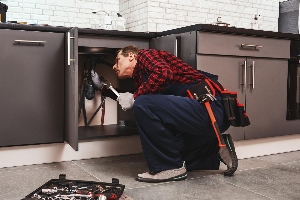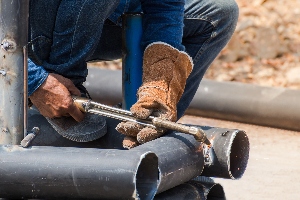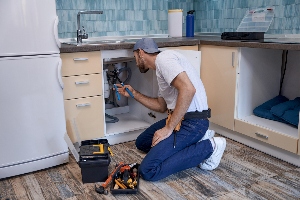Common signs that your water heater needs repairs include unusual noises, lack of hot water, and visible leaks.
Water heaters provide essential hot water for showers, dishes, and laundry but like any appliance, they can develop problems over time. Knowing the signs that your water heater needs repairs can save you from unexpected cold showers and costly damage.
These issues often point to problems like sediment buildup, faulty heating elements, or tank corrosion. By spotting these signs early, you can take action to fix minor issues before they become an expensive problem.
This guide outlines the most common symptoms of water heater trouble, from strange noises to inconsistent temperatures, and helps you determine whether a simple repair or full replacement is the smarter choice.
Here's what you need to know:
- Common water heater problems and how to identify them
- Should you repair or replace your water heater?
- How a failing water heater affects your energy bills
- Water heater maintenance checklist: Key tasks and expert recommendations
If you’re seeing changes in performance or bills, now is the time to act.
Common water heater problems and how to identify them
Water heaters can show several signs when in need of repairs and you should check for visible damage, performance problems, and unusual noises that may point to issues with your unit.
Visible signs your water heater is failing
Check for water pooling around the base of the tank as this suggests a water leak caused by a crack or loose connection. Rust or visible corrosion on the outside of the tank is another bad sign and may also lead to leaks if not addressed.
Discolored or rusty water from hot taps can mean the tank's interior is corroding, while smelly water might signal bacteria growth inside an old water heater. The anode rod protects the tank from rust and if it's worn out, your heater is at risk from such problems.
Hot water issues: What they mean and how to respond
Common issues like a lack of hot water, inconsistent water temperature, and long waits for hot water can stem from a faulty heating element, thermostat issues, or sediment buildup. An old water heater may simply lack the capacity to meet your needs.
If temperatures fluctuate while you shower, the mixing valve might be broken which is a safety concern and needs quick attention.
Noises from your water heater: What they mean
Strange noises from your water heater shouldn't be ignored. Listen for:
- Popping or rumbling sounds
- Hissing or sizzling
- Banging or knocking
Popping often means sediment buildup in the tank which makes your heater work harder and can lead to damage. Hissing might indicate a leak allowing water to drip onto the burner, while banging could be loose pipes or sudden temperature changes in the tank.
Should you repair or replace your water heater?
Deciding whether to repair or replace your water heater depends on several factors. We'll explore when repairs make sense and when it's time for a new unit.
When is it worth repairing your water heater?
Minor issues often don't require a full replacement and if your water heater is less than 10 years old or the problem is simple. A faulty heating element or a leaky drain valve can be fixed easily and these repairs are typically cheaper than buying a new unit.
We recommend calling a licensed plumber for a professional assessment who can spot issues and give you an accurate repair estimate. If the repair cost is less than half the price of a new water heater, it's usually worth fixing.
Signs it’s time to replace your water heater
Sometimes, replacement is the smarter choice and If your water heater is over 10 years old or needs frequent repairs, it's probably time for a new one. Constant repairs can add up quickly and become more expensive than replacement in the long run.
A new, energy-efficient water heater can lower your utility bills and provide more reliable hot water so it's a good investment if you're tired of cold showers and rising energy costs.
If repair costs are more than half the price of a new unit, replacement is usually the better option. We suggest getting quotes from a few plumbing services to compare costs and make the best choice for your home and budget.
How long should a water heater last? Lifespan by type and maintenance
Knowing how long a water heater should last helps homeowners make smarter decisions about repairs and replacements. While no unit lasts forever, expected lifespans vary by type and how well the system is maintained.
Conventional tank water heaters typically last 10 to 15 years, assuming they receive regular maintenance such as flushing, anode rod replacement, and leak inspections, according to the U.S. Department of Energy. Units that operate under hard water conditions or receive little maintenance may fail sooner due to internal corrosion or scale buildup.
Tankless water heaters, on the other hand, often exceed 20 years with proper care. These models don’t store water, reducing the risk of tank corrosion, but they are sensitive to mineral buildup and benefit from annual descaling, especially in hard water regions.
To maximize lifespan, homeowners should follow a consistent maintenance schedule, monitor performance signs, and have a professional inspect the system at least every two years. Once a unit nears the upper end of its lifespan, especially if problems occur frequently, it’s often more cost-effective to replace it.
Cost of water heater repairs vs. replacement
Cost is often the deciding factor when choosing between water heater repair and replacement. Understanding typical price ranges helps homeowners avoid overspending on short-term fixes that may not be worth it.
According to Angi, the average water heater repair cost is $603, depending on the problem and type of unit. Replacing a heating element in an electric model usually costs $200–$300, while fixing a faulty gas control valve can run about $350. Other tasks, like replacing the thermostat or drain valve, typically cost less but still require professional labor.
In contrast, replacing a tank water heater costs between $1,000 and $2,000 including labor and equipment, depending on the unit’s capacity, energy source, and installation complexity. Tankless units often cost more upfront, $2,000 to $4,000, but may offer lower operating costs over time.
As a rule of thumb, if the repair cost exceeds 50% of the price of a new unit, or if your water heater is more than 10 years old, it’s usually more economical to replace it. Additionally, new models offer improved energy efficiency and longer warranties, which can reduce long-term operating costs.
How a failing water heater affects your energy bills
A faulty water heater can lead to higher energy bills and reduced efficiency so it’s important to spot bill changes and identify ways to boost your heater's performance.
How to detect rising energy costs from your water heater
Keep an eye on your monthly costs and if they increase without reason, your heater may be the cause. Check previous bills to spot trends and compare winter and summer use, checking for any odd spikes. Heaters work harder in cold months, but the change shouldn't be extreme.
Don't ignore small increases as even a 10% jump can add up over time so track your energy use closely to catch problems early.
Improving energy efficiency
Take steps to make your water heater more energy-efficient to cut costs and extend its life. For example, set the temperature to 120°F (49°C) which is hot enough for most homes and saves energy. Insulate your heater and pipes and consider a timer that turns the heater off when you don't need hot water. This works well for predictable schedules.
Additionally, look into low-flow fixtures that use less hot water, easing the strain on your heater. Regular maintenance is also key as it keeps your system running at its best.
Water heater maintenance checklist: Key tasks and expert recommendations
Regular maintenance is essential to keep your water heater operating efficiently and extend its service life.
While some tasks are easy for homeowners to handle, others should be left to licensed professionals to ensure safe, code-compliant service. Here’s a breakdown of what should be done, and when.
Essential water heater maintenance tasks homeowners can do
Many maintenance tasks are safe and straightforward for homeowners with basic tools and precautions. One of the most important is flushing the tank once a year to remove sediment buildup. Sediment can reduce efficiency, clog valves, and create hot spots that weaken the tank lining.
Checking the pressure relief valve is another task that should be done annually. Simply lift the lever briefly to ensure it releases water, this confirms it can discharge pressure if needed. If nothing happens, or it leaks afterward, replacement is necessary.
Inspecting the area around your unit is just as important. Look for signs of rust, corrosion, or pooling water that could indicate a developing leak. Also, ensure there’s no clutter around the unit that could block airflow or create fire hazards, especially for gas models.
Finally, set your thermostat to 120°F (49°C), this is hot enough for household needs while preventing scalding and minimizing energy waste. This can usually be adjusted with a flathead screwdriver behind the access panel.
When to call a professional for routine water heater maintenance
While basic upkeep can be done by homeowners, some aspects of water heater maintenance are best handled by a licensed plumber. A key task is inspecting and possibly replacing the anode rod, which protects the tank from internal corrosion. This rod should be checked every 2–3 years and replaced when it’s significantly corroded or worn down to less than ½ inch in diameter.
Internal component testing, such as checking the heating elements, thermostat calibration, or gas burner efficiency, requires tools and expertise that go beyond DIY safety. Technicians also test for proper gas ventilation and electrical safety, especially in older systems.
For tankless models, descaling the unit with a vinegar flush or chemical cleaner is essential to prevent scale buildup in the heat exchanger—especially in areas with hard water. This is a standard part of professional annual service.
Getting a professional inspection every 2–3 years helps catch small issues before they lead to leaks, loss of performance, or costly repairs. It’s also a good opportunity to evaluate whether your current system is still right for your household’s needs.
Conclusion
Your water heater won’t last forever, but knowing the early signs of trouble can make the difference between a minor repair and a full replacement. From visible rust and water leaks to temperature fluctuations and strange noises, these symptoms often point to sediment buildup, worn-out components, or internal corrosion.
We’ve covered how to spot functional failures, assess energy usage, and decide when it’s time to repair versus replace your system. While minor issues like a faulty heating element can often be fixed cost-effectively, older units with repeated problems may require full replacement, especially if repairs exceed half the cost of a new model.
Staying alert to performance changes and scheduling routine maintenance are the best ways to extend your water heater’s life, improve efficiency, and avoid unexpected breakdowns.
For reliable water heater repair or replacement in Greenville or Spartanburg, contact One Call Plumbing to schedule a professional evaluation.
Get in touch to arrange your next inspection or to arrange emergency water heater repairs.












